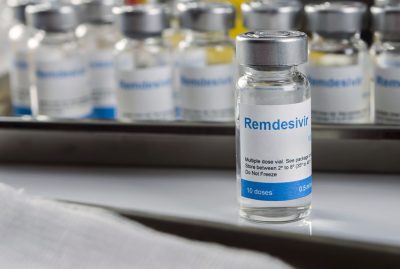
Restricting Remdesivir in an Immune Era: No Harm, Big Savings
June 1, 2025
By Jake Scott, MD
Synopsis: A quasi-experimental, eight-hospital, pre-post restriction of remdesivir to only symptomatic, oxygen-requiring, immunocompromised adults during July 2023 to June 2024 led to a 90% reduction in remdesivir use (37.7% to 4.1%) without any increase in 14- or 28-day all-cause mortality, 30-day readmission, or hospital length of stay. Medium- and high-risk covariate models confirmed no mortality signal, while an intriguing rise in intensive care unit admission and mechanical ventilation use among the few post-intervention recipients was most consistent with residual confounding and confounding by indication (i.e., the sickest patients being channeled to receive therapy). In an era of widespread hybrid immunity from Omicron-descended variants, broad remdesivir formulary restriction can be implemented safely and can yield substantial cost savings without compromising outcomes.
Source: Christensen A, Nelson Z, Gustafson S, et al. Into the unknown: Practical remdesivir restriction in the era of widespread SARS-CoV-2 seropositivity. Clin Infect Dis. 2025;Apr 25:ciaf217. doi:10.1093/cid/ciaf217. [Online ahead of print].
Investigators in an integrated Midwestern health system implemented a pharmacy-and-therapeutics-approved formulary change in June 2023 limiting remdesivir to patients meeting all three criteria: symptomatic COVID-19, supplemental oxygen requirement, and immunocompromised status, with infectious diseases (ID) override permitted.1 A 12-month pre-restriction epoch (June 2022–May 2023; n = 3,323) was compared with a 12-month post-restriction epoch (July 2023–June 2024; n = 1,451) after excluding early deaths and duplicate encounters. Demographics were balanced except for slightly higher age, comorbidity burden, steroid use, and vaccine doses in the post-intervention cohort. Fewer than 60 patients received remdesivir after restriction.
Unadjusted outcomes showed no difference in 14-day mortality (3.8% vs. 6.8% among treated patients pre- vs. post-restriction) or 28-day mortality, and no signal of benefit in the untreated comparators. Multivariable, medium-risk models yielded an odds ratio (OR) of 1.8 (95% confidence interval [CI], 0.54-5.8) for 14-day mortality comparing eras and an incidence rate ratio (IRR) of 1.0 for length of stay. Intensive care unit (ICU) admission and need for mechanical ventilation were paradoxically higher among treated patients post-restriction (OR of approximately 4 for ICU entry), attributed to indication bias and small numbers. Sensitivity analyses that excluded late (> 48 hour) initiations, as well as high-risk covariate models, were concordant. Drug-acquisition savings exceeded US $1.5 million; fewer patients experienced prolonged hospitalization to complete five intravenous (IV) doses.
Commentary
Early randomized trials suggested modest clinical benefit from remdesivir, yet those studies were conducted before widespread vaccination or Omicron circulation and enrolled largely immune-naïve populations.2-5 By mid-2023, with hybrid immunity firmly entrenched and COVID-19-attributable mortality in hospitalized patients already several-fold lower than during pre-vaccine waves, the incremental benefit of routine remdesivir became increasingly hard to justify.6,7 Against that backdrop, Christensen and colleagues show that withholding routine remdesivir from immunocompetent inpatients does not worsen outcomes and frees substantial resources.1
The intervention’s success highlights three broader points. First, cost-effectiveness thresholds have shifted. With a wholesale price near US $3,000 per course, a therapy that offers, at best, a fractional mortality benefit struggles to clear economic hurdles when baseline risk is already low. Second, IV treatment can impose hidden harms. Even absent drug toxicity, initiating remdesivir may tether otherwise discharge-ready patients to hospital beds, expose them to IV-line complications, and occasionally prompt unnecessary admissions when oral options are contraindicated. Third, guideline evolution lags behind epidemiology. National panels still conditionally recommend remdesivir for oxygen-dependent adults, but those statements rarely account for contemporary seroprevalence or health system budgets.8,9
This study, and similar stewardship initiatives, should prompt a reexamination of one-size-fits-all antiviral recommendations, encouraging a more targeted approach that reserves remdesivir for profoundly immunocompromised hosts, very early presenters who cannot receive nirmatrelvir-ritonavir, or select pregnant or renally impaired patients.
For institutions considering similar policies, key implementation steps include embedding clear eligibility criteria in admission order sets, ensuring rapid ID consult pathways for truly exceptional cases, and prospectively monitoring mortality and process measures to maintain clinician confidence. Collectively, the data strengthen the argument that in an immune population, “less is more” for remdesivir use, and that stewardship can safely redirect limited resources toward interventions with demonstrable patient-centered benefit.
Jake Scott, MD, is Clinical Associate Professor, Infectious Diseases and Geographic Medicine, Stanford University School of Medicine; Antimicrobial Stewardship Program Medical Director, Stanford Health Care Tri-Valley.
References
1. Christensen A, Nelson Z, Gustafson S, et al. Into the unknown: Practical remdesivir restriction in the era of widespread SARS-CoV-2 seropositivity. Clin Infect Dis. 2025;Apr 25:ciaf217. doi:10.1093/cid/ciaf217. [Online ahead of print].
2. Wang Y, Zhang D, Du G, et al. Remdesivir in adults with severe COVID-19: A randomised, double-blind, placebo-controlled, multicentre trial. Lancet. 2020;395(10236):1569-1578.
3. Spinner CD, Gottlieb RL, Criner GJ, et al. Effect of remdesivir vs standard care on clinical status at 11 days in patients with moderate COVID-19: A randomized clinical trial. JAMA. 2020;324(11):1048-1057.
4. Beigel JH, Tomashek KM, Dodd LE. Remdesivir for the treatment of Covid-19 — Preliminary report. Reply. N Engl J Med. 2020;383(10):994.
5. Ader F, Bouscambert-Duchamp M, Hites M, et al. Remdesivir plus standard of care versus standard of care alone for the treatment of patients admitted to hospital with COVID-19 (DisCoVeRy): A phase 3, randomised, controlled, open-label trial. Lancet Infect Dis. 2022;22(2):209-221.
6. Jones JM, Stone M, Sulaeman H, et al. Estimated US infection- and vaccine-induced SARS-CoV-2 seroprevalence based on blood donations, July 2020-May 2021. JAMA. 2021;326(14):1400-1409.
7. Adjei S, Hong K, Molinari NAM, et al. Mortality risk among patients hospitalized primarily for COVID-19 during the Omicron and Delta variant pandemic periods — United States, April 2020-June 2022. MMWR Morb Mortal Wkly Rep. 2022;71(37):1182-1189.
8. Bhimraj A, Morgan RL, Shumaker AH, et al. Infectious Diseases Society of America Guidelines on the Treatment and Management of Patients with COVID-19. Clin Infect Dis. 2020;Apr 27:ciac724. doi:10.1093/cid/ciac724. [Online ahead of print].
9. World Health Organization. Clinical Management of COVID-19: Living Guideline. World Health Organization; 2022. http://www.ncbi.nlm.nih.gov/books/NBK582435/